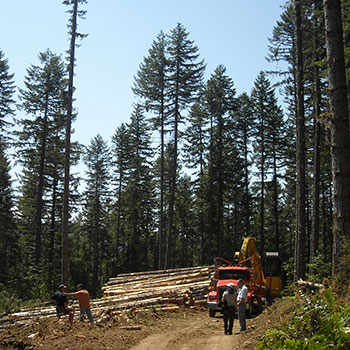Farm Bill helps forests, too
 On December 20th, President Donald Trump signed the 2018 Farm Bill (H.R. 2) into law. Officially titled the Agriculture Improvement Act of 2018, the bill sets policies on a wide range of agriculture-related policy, affecting crop insurance, subsidies, rural development, nutrition assistance, and conservation.
On December 20th, President Donald Trump signed the 2018 Farm Bill (H.R. 2) into law. Officially titled the Agriculture Improvement Act of 2018, the bill sets policies on a wide range of agriculture-related policy, affecting crop insurance, subsidies, rural development, nutrition assistance, and conservation.
Though it’s called the Farm Bill, it helps forests, too. It allocates about $1.8 billion over the next four years for the tools our nation’s private forest owners need to keep our forests healthy. For that reason, Pacific Forest Trust supported this bill along with a coalition of organizations that represent millions of forest owners, conservationists, hunters, anglers, forest products manufacturers, and natural resource professionals.
The Farm Bill is a substantial piece of legislation that typically receives strong bipartisan support and has been renewed every five years since 1933. When the 2014 Farm Bill expired on September 30, 2018, farmers, ranchers, and forest landowners were unable to enroll in many existing conservation programs. The signing of this bill restores landowners’ access to funding to conserve private lands and conduct a variety of forestry activities.
Among the things this year’s Farm Bill does for forests and landowners:
- The bill funds the Environmental Quality Incentives Program (EQIP), which is an incentive-based program for voluntary conservation of working lands. Funding for EQIP starts at $1.75 billion in 2019 and increases to $2.025 billion by fiscal year 2023. The bill also increases the program’s emphasis on improving wildlife habitat and controlling invasive species. (PFT projects have leveraged EQIP funding.)
- It reforms the Conservation Reserve Program (CRP) through 2023 to allow for an increased acreage cap (from 24 million acres to about 27 million acres between 2019 and 2023) while also reducing rental rates, cost-share, and incentive payments.
- The bill codifies the U.S. Forest Service Landscape Scale Restoration Program (LSRP) and provides $20M in funding. It expands existing authorities to focus the LSRP on cross‐boundary restoration to address concerns such as watershed restoration, wildfire risk reduction, and wildlife habitat conservation.
- Conservation Innovation Grants stimulate the development and adoption of innovative approaches and technologies for conservation on agricultural lands. The bill removes the existing funding cap and expands the program to include community colleges.
- The bill increases annual mandatory funding by $450 million for the Agricultural Conservation Easement Program and makes it more efficient.
- The bill allocates $300 million in mandatory funding for the Regional Conservation Partnership Program (RCPP) to encourage partnership in forest management. It also allows new RCPP arrangements that explore alternative funding distribution mechanisms with an eligible partner to implement activities on the land.
- The bill reauthorizes and provides $12 million in discretionary annual funding for the Healthy Forests Reserve Program and maintains its eligibility within the RCPP.
- The bill authorizes $25 million in annual discretionary funding from 2019 – 2023 for the Community Wood Energy Program and modifies it to support grants for new infrastructure, new mills, and added capacity through the use of low value, small-diameter material.
- The bill establishes a performance‐driven research and development program, originally introduced in the Timber Innovation Act, to help advance research funded by Wood Innovation Grants.
The Farm Bill typically receives significant bipartisan support. The legislation passed the House on December 12, 2018 by a vote of 369-47, one day after the Senate approved the bill 87-13. Now that the bill has been signed into law, these programs will continue to ensure forest landowners have access to funding for innovative conservation.
